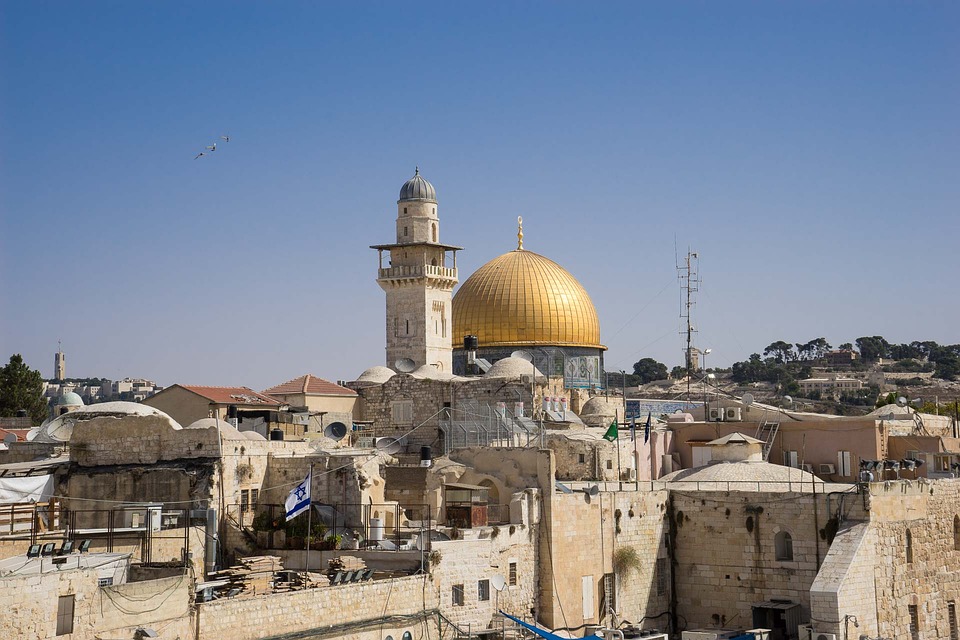FRESH AIR
UPDATES
When historical facts become unacceptable – the effects of UNESCO Resolutions on Jerusalem
February 2, 2017 | Shmuel Levin

Shmuel Levin
“It’s clear as the sun is clear that the Temple [in Jerusalem] which was demolished by the Romans, is a Jewish temple.”
Seems straightforward, doesn’t it?
Yet, in today’s post-truth world, such historical facts are no longer acceptable in some official Palestinian circles.
The above statement about the Jewish Temple was made by United Nations Secretary-General António Guterres in comments to Israel Public Radio.
Guterres also stated that “no one can deny the fact that Jerusalem is holy to three religions today”.
Yet, in response, Adnan al-Husseini, the Palestinian Authority’s Jerusalem Affairs Minister, demanded that Guterres “issue an apology to the Palestinian people”. Similarly, the Deputy Secretary of the Fatah Revolutionary Council, Faiz Abu Ita, stated on Palestinian Authority Television that Guterres’ comments were “infuriating” and “unjustified” from “ethical, humanitarian, and political” standpoints.
Further, Palestinian President Mahmoud Abbas’ Assistant Ahmed Majdalani also criticized Guterres for lacking “cultural knowledge”. Majdalani claimed “the statement is a strike to the credibility of the UN as a global organization that should stay to the side of the occupied people and be against the power of the occupation.”
It seems then, that the United Nations’ support for the Palestinians is now expected to include the denial of basic historical facts.
Even the Muslim Waqf, which has long overseen Islamic activities on the site, produced a booklet in 1925 stating that the Temple Mount’s “identity with the site of Solomon’s Temple is beyond dispute.” The booklet then quotes the Biblical book of Samuel II indicating that it is also the spot, “according to universal belief, on which ‘David built there an altar unto the L-rd…'” In fact, the Quran itself references the Jewish Temple, and Islamic sources have acknowledged that its location was in Jerusalem.
This is not to say that Palestinian revisionism is unheard of. In 2001, the then Mufti of Jerusalem, a cleric appointed by Yasser Arafat, stated that “there isn’t even a single stone in the Old City of Jerusalem that is Jewish,” and that “there is no proof at all that the Jews were ever in Jerusalem.”
More recently, since 2015, the Palestinians began a drive to change the language with which UNESCO refers to the Temple Mount area. After failing to have it declared a solely Muslim site, they submitted resolutions on Jerusalem “at every possible UNESCO meeting”, using only the Muslim name for the site.
This strategy brought success in a resolution approved by UNESCO’s World Heritage Committee in October 2016. While the resolution briefly acknowledged the “importance of the Old City of Jerusalem and its Walls for the three monotheistic religions”, it made no mention of Jewish ties to the Temple Mount, and exclusively referred to the holy site by the name it is known in Islam, the Al-Aqsa Mosque/ Al-Haram Al-Sharif.
While some commentators have sought to downplay the significance of the UNESCO resolution, on grounds that it “commits the sin of omission, not of commission”, it appears that the Palestinian leadership does not see it this way. In al-Husseini’s attack on Guterres, he claimed that Guterres had “ignored UNESCO’s decision that considered the Al-Aqsa mosque of pure Islamic heritage”.
All for simply stating a historical fact, which no serious expert, or historian disputes.
There are then two takeaways here. First, one-sided UNESCO resolutions are not just words, but can carry repercussions down the track that can make achieving a genuine two-state peace harder.
Second, Palestinian leadership single-mindedness on this issue no longer takes account of basic historical truths, insisting that the narrative of an “occupied people” take precedence over mere facts. This is yet another blow to peace hopes, which rely on both sides being willing to concede some legitimacy and rights to the other party.
Tags: Israel
RELATED ARTICLES

‘Time’s up for talk’: Joel Burnie discusses Antisemitism Envoy’s report on Sky News

‘Optimism’ for Hamas to ‘exile’ their power and create a permanent ceasefire with Israel: Joel Burnie on Sky News

Australian government’s response to Iran-Israel conflict ‘disappointing’: Paul Rubenstein on Sky News




















